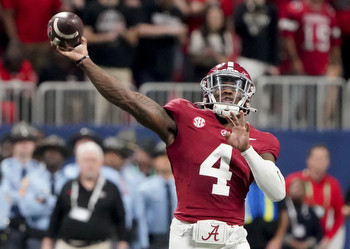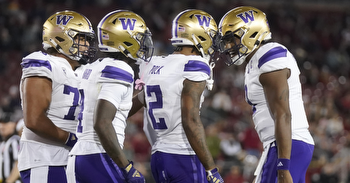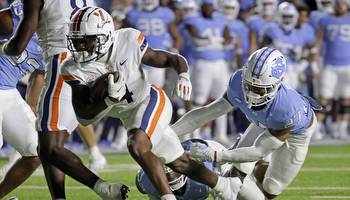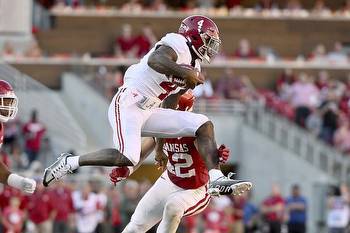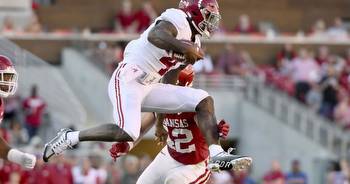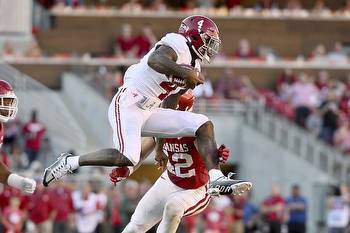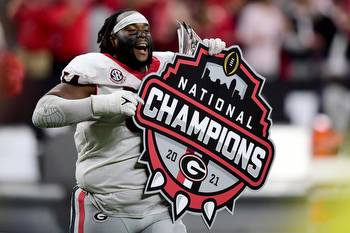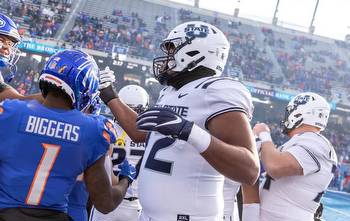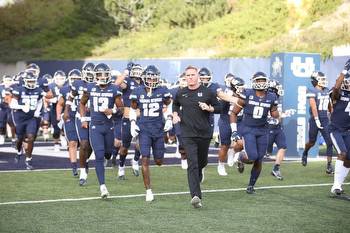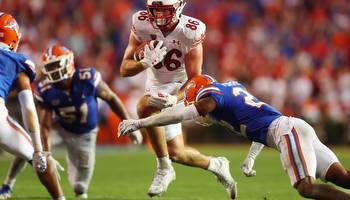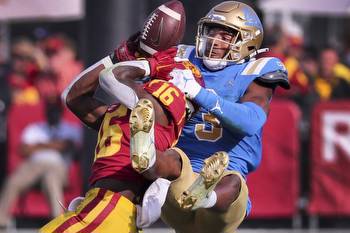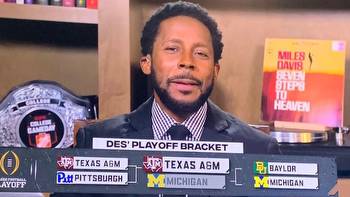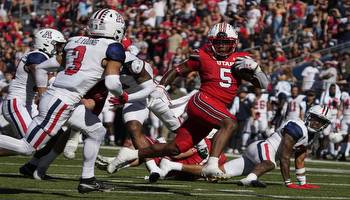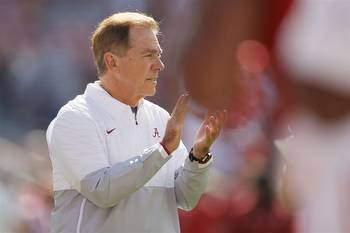Big bets on Aggie football spur flurry of speculation online
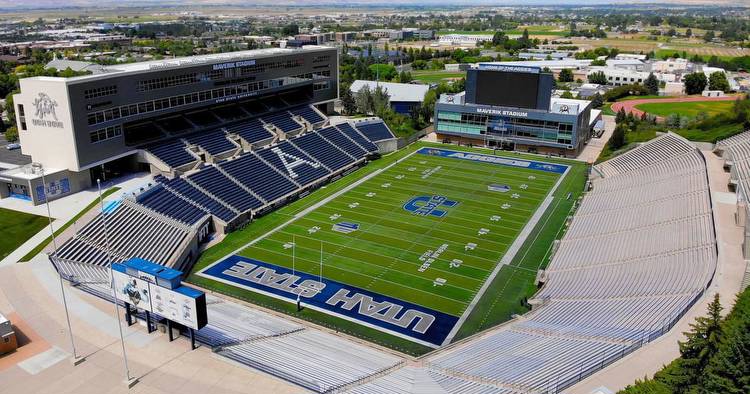
Utah State University’s football team has made some headlines over the past couple of weeks — not for anything they’ve done, but what a few bold bettors are hoping they will do.
The news first broke on April 18, when Caesars Sportsbook tweeted a bettor in New Jersey had placed $1,000 on the Aggies to win the national championship — at 1,000-to-1 odds for a potential $1,000,000 payout.
The bet drew a lot of attention, both from the sports world and social media. One article was posted to a college football forum on Reddit, garnering over 250 comments.
“What does this man know?” asked the user who posted the link.
“He knows how to lose a grand,” read the top reply.
Within two days of the original bet’s news, two more were placed for USU to win it all, at the time making the Aggies tied for third — alongside the Texas A&M Aggies — for most bets at or over $1,000 to take home the title. As of a week ago, both Aggie teams sat above Georgia and Oklahoma, with two and one bets over $1,000, respectively, but were beaten out by Ohio State and Alabama — Utah State’s week-two opponent in the upcoming season.
Posters online put up a wide range of explanations for the bet, from Back to the Future-style time travel trickery, to trying to unload as much money as possible amid a pending divorce, to simply bad decision making under the influence of a gambler’s high.
“Thats clearly one of those bets you make when its 9am in vegas, youre still up, and you won $17500 the night before,” wrote one Reddit commenter.
Some attributed the bet to user error, guessing the bettor was trying to put money on the University of Utah. Others were just happy to have USU in the headlines.
“Regardless why people are betting on us. It's awesome to keep seeing USU all over and being talked about. Best 3k ever spent on Aggies haha,” wrote aggiesdidwhat on USUFans.com.
The big bets weren’t all monetary. One Twitter user went all-in, putting up not only this mortal life, but his potential afterlife as well — in addition to 10 percent of his income for the remainder of his days.
“If this hits,” tweeted Tom Doretto, “I will convert to Mormonism.”
“And we’ll welcome you with open arms, Tom!” another user responded.
One explanation, pointed out by many online, was that what they would be betting on is not the championship, but the week two matchup — if USU wins, the odds against a potential playoff run drop exponentially, meaning the existing 1,000-to-1 bet is worth much more than it was before.
“If USU somehow beats Alabama, Caesars is going to start to offer buy-out amounts as the weeks go on. They will only get richer as the Aggies keep winning,” wrote USUFans user YoungBloodAggie.
In response to the bets, Caesars Sportsbook already dropped USU’s odds to 750-to-1, meaning the original has already grown in value relative to a bet placed today.
“USU isn't winning the natty, but this bettor is actually making a bet on the odds markets working out in his favor,” YoungBloodAggie wrote. “This is how the pros do it.”
The less exciting explanation is the bettors may just be very wealthy. Far from the vision of a high-level, expertly navigated playing of the odds, these bets could easily be the lark of some who wouldn’t miss $1,000.
USU’s stock may be rising, but their chances are currently outpaced by in-state rivals Utah and Brigham Young University. Utah’s odds on a few sites sit between 50- and 40-to-1, while BYU’s are slightly more comparable, between 200- and 100-to-1. On those same sites, USU is also given stronger odds than those found on Caesars, sitting between 200- and 500-to-1.
Though it doesn’t seem the bettors are Aggie superfans, you’d be hard-pressed to find any to argue USU is poised to take home the College Football Playoff National Championship Trophy this year. For some fans, this would not necessarily be by any fault of the team, but instead the College Football Playoff system where end-of-year matchups are decided by an oft-criticized committee.
“Utah State could have an NFL-caliber roster and go undefeated for 10 years and never even sniff the playoff because ‘strength of schedule’ or some nonsense. Wasted bet,” tweeted Eric Walker. “Then again, never say never. GO AGGIES.”
Though hundreds if not thousands of factors go into the evaluation of college football teams, one that’s difficult to measure is the relative prestige of the conferences the schools hail from. Polls and committees are regularly accused of unfairly favoring historically good or important teams from respectable conferences. The last team not in a “Power 5” conference — The Big Ten, Big 12, Atlantic Coast, Pac-12 or Southeastern — to win a championship was BYU in 1984.
The CFP was introduced to college football in 2014 after nearly two decades of the Bowl Championship Series, which many felt unfairly favored prestige or profits over merit when it came to deciding what teams would play in which bowl.
Schools from USU’s own state and conference were both regularly cited by BCS critics as key examples of talented teams being left out of a chance to play for the national championship. Though the BCS was first implemented in 1998, a non-P5 team wasn’t selected for a bowl until Utah went undefeated in 2004. The next non-P5 team bowl berth came two years later, when an undefeated Boise State faced and upset Big 12 champion Oklahoma in the Fiesta Bowl. Both Utah and Boise State were perennial performers through the aughts alongside other schools like TCU, making a case for the strength of less-prestigious conferences.
Far from solving this issue, the introduction of the CFB seems to have supercharged it, as there are now four spots a potential non-P5 team could take in the playoff, meaning the committee doesn’t have to just justify a team not being in the top two in the nation, but the top four.
The discourse over the egalitarianism of the playoff reached new heights last season when Cincinnati, a member of the American Athletic Conference, went undefeated for two consecutive regular seasons but was still considered “on-the-bubble” to be included in the four teams chosen to compete for the title.
When Cincinnati was ultimately selected, they became the first non-P5 team included since the playoff’s inception. They faced Alabama, who would beat them 27-6. For some, this was proof non-P5 teams can’t compete against perennial powerhouses, but for others it was an encouraging first step in increasing parity in college football.
Despite the long odds, many commenters wrote that if USU did defeat Alabama, BYU and Boise State this year, it’d be unlikely they’d be snubbed for a playoff berth, perhaps offering a potential grudge match with the Crimson Tide.
With how unlikely such a Cinderella run may be for the Aggies, many online said the bettors’ money was as good as gone — but some felt there were more wasteful places they could have spent their money.
“Probably the worst bet I have ever seen,” wrote one Twitter user in reaction to the original bet.
“Nah,” responded another. “That would be the Lions to win the Super Bowl.”


